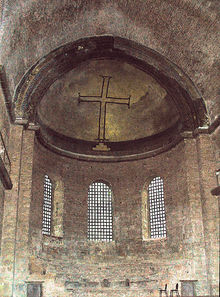Byzantine Iconoclasm
Appearance

Byzantine Iconoclasm refers to two periods in the history of the Byzantine Empire when the use of religious images or icons was opposed by religious and imperial authorities within the Eastern Church and the temporal imperial hierarchy.
| This history article is a stub. You can help out with Wikiquote by expanding it! |
Quotes
[edit]Biblical passages cites by iconoclasts
[edit]- Thou shalt not make unto thee any graven image (Hebrew פסל) or any likeness of any thing that is in heaven above, or that is in the earth beneath, or that is in the water under the earth.
- Exodus 20:4
- God is spirit, and they that worship him must worship him in spirit and in truth.
- John 4:24
- Claiming to be wise, they became fools, and exchanged the glory of the immortal God for images (εἰκόνος) resembling mortal man.
- Romans 1:22-23
Iconoclastic Conciliabulum, 754 AD
[edit]- What avails, then, the folly of the painter, who from sinful love of gain depicts that which should not be depicted—that is, with his polluted hands he tries to fashion that which should only be believed in the heart and confessed with the mouth? He makes an image and calls it Christ.
- If anyone shall endeavor to represent the forms of the Saints in lifeless pictures with material colors which are of no value (for this notion is vain and introduced by the devil), and does not rather represent their virtues as living images in himself, let him be anathema!

